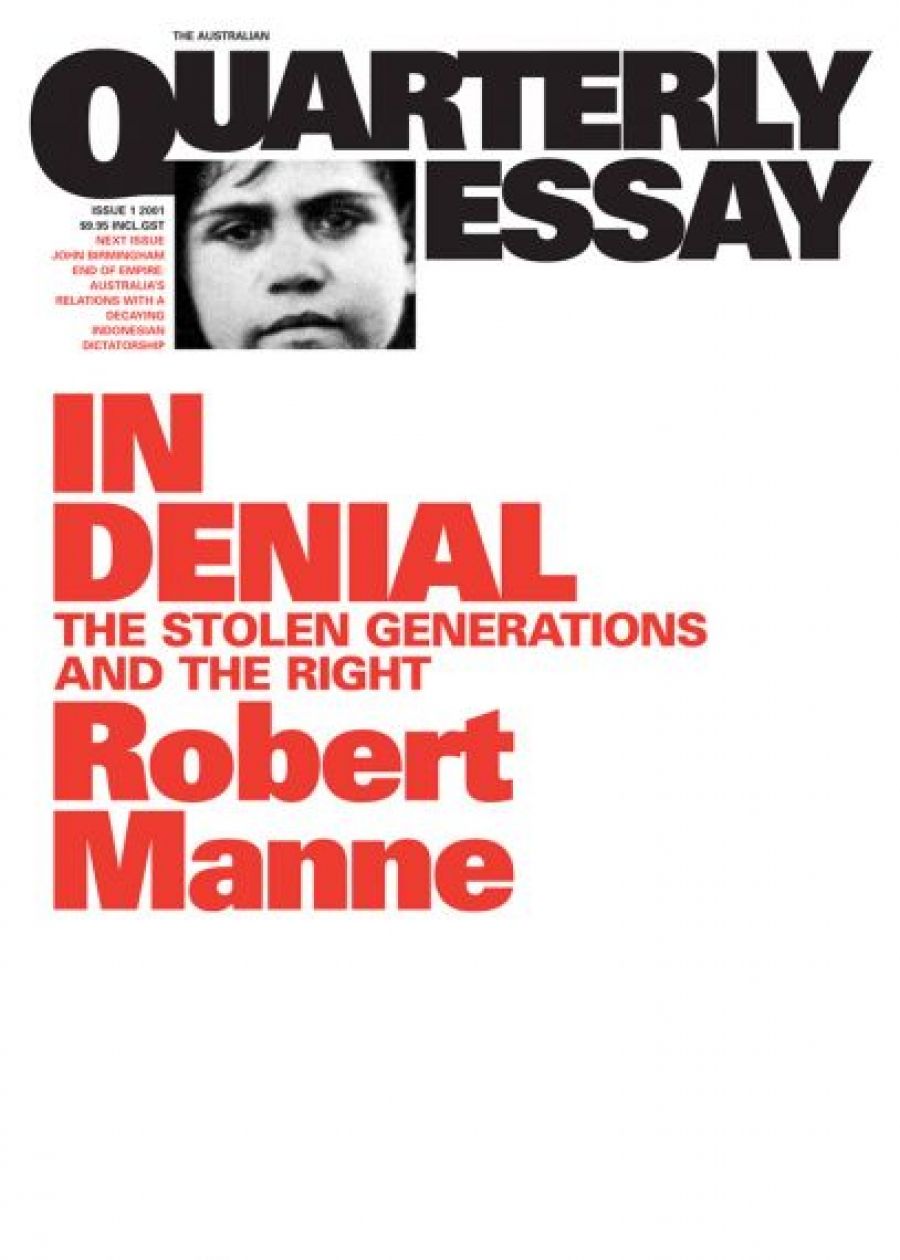
- Free Article: No
- Contents Category: Politics
- Review Article: Yes
- Online Only: No
- Custom Highlight Text:
Much current debate on crucial issues facing Australia – the economy, race relations, foreign affairs, for example – is conducted in the opinion pages of metropolitan daily newspapers. And ‘opinion’ pages they now are – with a vengeance. It is a symptom of the times that opinion-page editors have less and less recourse to disinterested authorities ...
- Book 1 Title: In Denial: The Stolen Generations and the Right (Quarterly Essay 1)
- Book 1 Biblio: Schwartz Publishing, $9.95 pb, 113 pp, ISS 1444 884X
In Manne, Craven, and Schwartz found a natural pamphleteer, a writer of passion and conviction, an occasional polemicist and one of the prominent players in the bitter debate over the Aboriginal Stolen Generations. They took a risk: the essay might simply have extended the rhetorical jousting that has characterised so much of this debate. Certainly, Manne’s critics have moved quickly (in opinion pieces) to discredit both the findings of the essay and the intentions of its author. They allow scant integrity of motive, and little virtue or veracity in the essay’s extensive documentation. Ron Brunton, in the Age, writes that Manne ‘Feverishly conjures up an organised plot by "the right" to deny the reality of forcible removals’. In The Australian Financial Review, Christopher Pearson declares that it is Robert Manne and Sir Ronald Wilson (who, with Mick Dodson, headed the Stolen Generations’ inquiry) who are in a state of denial about this complex, ambivalent chapter of our recent history. One-time Minister for Aboriginal Affairs, Peter Howson, labels Manne a generation myth-maker’ (in the Age).
But the critics’ labelling, speculation about motive and opportunistic annexing of some of Manne’s conclusions (particularly about numbers) to bolster their own case, do not counter the essay’s detailed accumulation of evidence. In Denial takes full advantage of its extended format to argue (and I mean argue, not merely assert) a detailed case that is in broad agreement with the spirit of the conclusions of the Stolen Generations Bringing Them Home report but which is at the same time frank about the methodological shortcomings and the factual flaws in that report, particularly as they relate to the estimated numbers of Aboriginal children taken from their parents. Manne differs from the critics on this issue in that he does not believe that the entire report can be discredited because there is contrary evidence about numbers. There is an impassioned echo of King Lear about his conviction here – reason not the need for human dignity. And don’t split hairs about what constitutes ‘a generation’ when the suffering of so many Aboriginal children and their parents is so palpable. The essay’s opening, a recounting of four of the documented cases, makes that point eloquently.
Manne deals, convincingly, with many of the criticisms of the report’s supposed failures: for example, the claim that it failed to test the evidence of its Aboriginal witnesses – by detailing the funding circumstances of the inquiry. Two million dollars were allowed for the hearing of 535 Aboriginal witnesses. The inquiry did not have a Royal Commission’s investigative powers or resources. (The Royal Commission into Aboriginal Deaths in Custody, by contrast, cost $30 million – not that the expenditure has guaranteed the implementation of its findings.)
Manne also looks, in considerable detail, at the documentation of official Australian policy on the removal of ‘half-caste’ children before and after World War II. It is difficult not to conclude – from the official record, not from any interpretation of Robert Manne’s – that the pre-war policies were intent on ‘breeding out the colour’, were racist and, however well-intentioned, shameful. After the war, the intentions become assimilationist, not eugenic. The point of Manne’s pre-postwar distinction is to bring some precision to the argument about the charges of genocide that have been so controversial in this debate.
The other prong of In Denial is its detailing of the conceited campaign by the Right to discredit the Bringing Them Home report (and related issues, such as the extent of Aboriginal deaths in frontier wars). Manne is forensic rather than feverish in the ways he goes about documenting his allegations here. He details the publishing persistence, the connections between the group of writers, their association with Quadrant, its related conference activities and links (most telling to the Howard Government, through the person of the prime minister, a self-declared devotee of Quadrant under its current editor, P.P. McGuinness). Where there is common ground, notably with some of the conclusions of Ron Brunton, he acknowledges it. But overall his judgment, both on the accuracy and integrity of the Right’s attack, is scathing.
In complex intellectual conflicts, there will always be argument about whether the antagonists are committed to finding the truth or to winning the battle. This essay tells us that Robert Manne is intent on finding the truth.


Comments powered by CComment